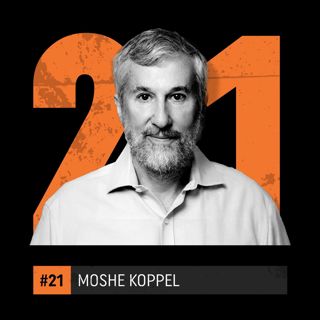
Moshe Koppel: 'We won the war in Gaza'
Israel has pretty much destroyed its enemies, Moshe Koppel says. That's (partly) why he believes Israel has won the war in Gaza.Founding chairman of the Kohelet Policy Forum—called “the most successful initiative of the right in the past decade" by Haaretz—Moshe is a political thinker and computer scientist deeply involved in Israel's political affairs. He and his think tank propelled the Knesset's 2018 Nation-State Law and the push for judicial reform.Also a professor emeritus of computer science at Bar-Ilan University, Moshe is the founding director of Dicta, a research institute devoted to developing tools for computational analysis of Hebrew texts, and the author of three books on Jewish thought.Now, he joins Sruli Fruchter to answer 18 questions on Israel, including religion & state, the war in Gaza, and Israel's greatest threats.This interview was held on Nov. 27.Here are our 18 questions:As an Israeli, and as a Jew, how are you feeling at this moment in Israeli history?What has been Israel’s greatest success and greatest mistake in its war against Hamas?How do you think Hamas views the outcome and aftermath of October 7—was it a success, in their eyes? What do you look for in deciding which Knesset party to vote for?Which is more important for Israel: Judaism or democracy?Should Israel treat its Jewish and non-Jewish citizens the same?What role should the Israeli government have in religious matters?Now that Israel already exists, what is the purpose of Zionism?Is opposing Zionism inherently antisemitic?Is the IDF the world’s most moral army?If you were making the case for Israel, where would you begin?Can questioning the actions of Israel’s government and army — even in the context of this war — be a valid form of love and patriotism?What do you think is the most legitimate criticism leveled against Israel today?Do you think peace between Israelis and Palestinians will happen within your lifetime?What should happen with Gaza and the Palestinian-Israeli conflict after the war?Is Israel properly handling the Iranian threat?Where do you identify on Israel’s political and religious spectrum, and do you have friends on the “other side”?Do you have more hope or fear for Israel and the Jewish People.
9 Joulu 20241h

Einat Wilf: 'Jews are never allowed to win, and Arabs are never allowed to lose'
The true enemy in Israel's current war, Einat Wilf says, is what she calls "Palestinianism."Once part of the Israeli left, Einat Wilf is a popular political thinker on Israel, Zionism, and foreign policy. Her 2020 co-authored book, "The War of Return," outlines what she believes lies at the core of the Palestinian-Israeli conflict: the Palestinian people's "Right of Return" is what makes this conflict unresolvable.Einat served in Israel's Knesset from 2010 to 2013 and now lectures and writes widely on contemporary issues. She is the author of seven books and hosts the "We Should All Be Zionists" podcast. She has a BA from Harvard, an MBA from INSEAD in France, and a PhD in Political Science from the University of Cambridge. Now, Einat joins Sruli Fruchter to answer 18 questions on Israel, including what Palestinianism is, why Israel's war aims are flawed, and the future of Gaza.This interview was held on Nov. 25.Here are our 18 questions:As an Israeli, and as a Jew, how are you feeling at this moment in Israeli history?What has been Israel’s greatest success and greatest mistake in its war against Hamas?How do you think Hamas views the outcome and aftermath of October 7—was it a success, in their eyes? What do you look for in deciding which Knesset party to vote for?Which is more important for Israel: Judaism or democracy?Should Israel treat its Jewish and non-Jewish citizens the same?What role should the Israeli government have in religious matters?Now that Israel already exists, what is the purpose of Zionism?Is opposing Zionism inherently antisemitic?Is the IDF the world’s most moral army?If you were making the case for Israel, where would you begin?Can questioning the actions of Israel’s government and army — even in the context of this war — be a valid form of love and patriotism?What do you think is the most legitimate criticism leveled against Israel today?Do you think peace between Israelis and Palestinians will happen within your lifetime?What should happen with Gaza and the Palestinian-Israeli conflict after the war?Is Israel properly handling the Iranian threat?Where do you identify on Israel’s political and religious spectrum, and do you have friends on the “other side”?Do you have more hope or fear for Israel and the Jewish People?
2 Joulu 20241h 22min
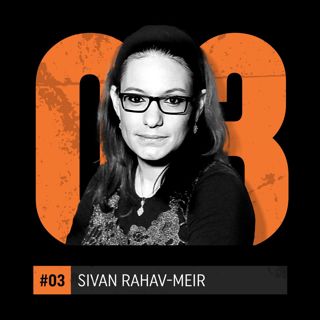
Sivan Rahav-Meir: 'When it comes to terrorism, you can't compromise' (Re-Run)
We return next week with a new episode of 18 Questions, 40 Israeli Thinkers. In the meantime, enjoy an earlier interview with Sivan Rahav-Meir.Israel's fight against Hamas, Sivan Rahav-Meir says, is preventing another Oct. 7—and another Sept. 11.The Israeli religious journalist — voted Israel’s most popular media personality — grew up secular and part of the Israel left’s “Peace Now” movement, but she’s not quite there anymore.Now a journalist for Israel TV news, a columnist for Yediot Aharonot newspaper, and host of a weekly radio show on the Army Radio, Sivan is a leading figure in Israeli society more broadly — and the religious society specifically.A 2017 Forward profile described her as “a female sort of Hasidic grand rabbi” because of the thousands flocking to her Torah lectures. She sends a Jewish insight each day to tens of thousands of WhatsApp subscribers The Daily Thought. Now, she sits down with Sruli Fruchter to answer 18 questions on Israel, including Israel’s battle against terrorism, living in Messianic times, that time she interviewed Yitzchak Rabin, and so much more.This interview was held on July 4.Here are our 18 questions:As an Israeli, and as a Jew, how are you feeling at this moment in Israeli history?What has been Israel’s greatest success and greatest mistake in its war against Hamas?How have your religious views changed since Oct. 7? What do you look for in deciding which Knesset party to vote for?Which is more important for Israel: Judaism or democracy?Should Israel treat its Jewish and non-Jewish citizens the same?Now that Israel already exists, what is the purpose of Zionism?Is opposing Zionism inherently antisemitic?Should Israel be a religious state?If you were making the case for Israel, where would you begin?Should all Israelis serve in the army?Can questioning the actions of Israel’s government and army — even in the context of this war — be a valid form of love and patriotism?What do you think is the most legitimate criticism leveled against Israel today?Do you think the State of Israel is part of the final redemption?Is Messianism helpful or harmful to Israel?Do you think peace between Israelis and Palestinians will happen within your lifetime?Where do you identify on Israel’s political and religious spectrum, and do you have friends on the “other side”?Do you have more hope or fear for Israel and the Jewish People?
25 Marras 202445min
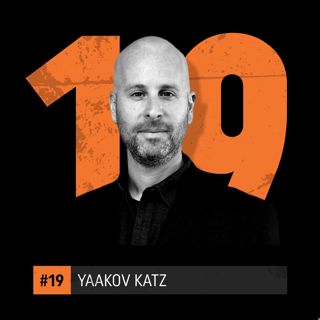
Yaakov Katz: 'The Israeli military has fought in probably the most humane way possible'
If you asked Yaakov Katz, the world should be lining the streets to applaud the IDF's military campaign in Gaza.The decades-long journalist and political thinker is emphatic that the IDF fights in the most humane and moral way possible. A senior fellow at the Jewish People Policy Institute and former editor in chief of the Jerusalem Post, Katz has his pulse on many sectors of Israeli society today—from the government to civil society.Katz authored three books on Israel's military prowess and regional affairs, and his fourth book on Oct. 7 is set to release next year. He also writes a regular column for Newsweek, the Jewish Chronicle, and the Jerusalem Post, and is the host of the JPPI weekly podcast.Now, he joins Sruli Fruchter to answer 18 questions on Israel, including Israeli media's coverage of the war, the IDF's military ethics, and the "day-after" plan in Gaza.This interview was held on Nov. 13.Here are our 18 questions:As an Israeli, and as a Jew, how are you feeling at this moment in Israeli history?What has been Israel’s greatest success and greatest mistake in its war against Hamas?Do you think Western media covers the Israel-Hamas War fairly?What do you look for in deciding which Knesset party to vote for?Which is more important for Israel: Judaism or democracy?What role should the Israeli government have in religious matters?Should Israel treat its Jewish and non-Jewish citizens the same?Now that Israel already exists, what is the purpose of Zionism?Is opposing Zionism inherently antisemitic?Is the IDF the world’s most moral army?If you were making the case for Israel, where would you begin?Can questioning the actions of Israel’s government and army — such as in the context of this war — be a valid form of love and patriotism?What do you think is the most legitimate criticism leveled against Israel today?Do you think peace between Israelis and Palestinians will happen within your lifetime?What should happen with Gaza and the Palestinian-Israeli Conflict after the war?Do you think Israel is properly handling the Iranian threat?Where do you identify on Israel’s political and religious spectrum, and do you have friends on the “other side”?Do you have more hope or fear for Israel and the Jewish People?
18 Marras 20241h 15min
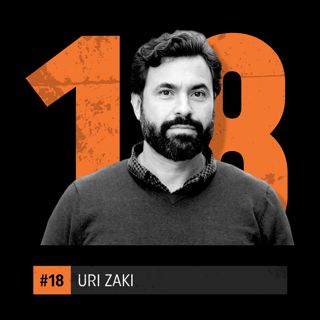
Uri Zaki: 'The war has to end in Gaza'
Uri Zaki supported Israel's war against Hamas from the getgo—but the killing of six hostages and Sinwar's assassination were a turning point. Now, he thinks it needs to end.Uri Zaki is a left-wing political thinker and activist. He founded the New Israel Fund’s The Front for the Protection of Democracy and was previously the chairperson of the Meretz (Israel’s left-wing party) executive board and has worked at and with several Zionist and human rights organizations. In 2010, he was the founding director B'Tselem USA, the American chapter of Israel's most prominent and controversial Israeli human rights organization. A proud Zionist and left-winger, Uri has fiercely defended Israel's war against Hamas since October 7. But over one year later, he thinks things need to change.Now, he joins Sruli Fruchter to answer 18 questions on Israel, including West Bank settlements, Israeli leadership, and ending the war in Gaza.This interview was held on Oct. 30.Here are our 18 questions:As an Israeli, and as a Jew, how are you feeling at this moment in Israeli history?What has been Israel’s greatest success and greatest mistake in its war against Hamas?How do you think Hamas views the outcome and aftermath of October 7—was it a success, in their eyes? What do you look for in deciding which Knesset party to vote for?Which is more important for Israel: Judaism or democracy?Should Israel treat its Jewish and non-Jewish citizens the same?What role should the Israeli government have in religious matters?Now that Israel already exists, what is the purpose of Zionism?Is opposing Zionism inherently antisemitic?Is the IDF the world’s most moral army?If you were making the case for Israel, where would you begin?Can questioning the actions of Israel’s government and army — even in the context of this war — be a valid form of love and patriotism?What do you think is the most legitimate criticism leveled against Israel today?Do you think peace between Israelis and Palestinians will happen within your lifetime?What should happen with Gaza and the Palestinian-Israeli conflict after the war?Is Israel properly handling the Iranian threat?Where do you identify on Israel’s political and religious spectrum, and do you have friends on the “other side”?Do you have more hope or fear for Israel and the Jewish People?
11 Marras 20241h 18min
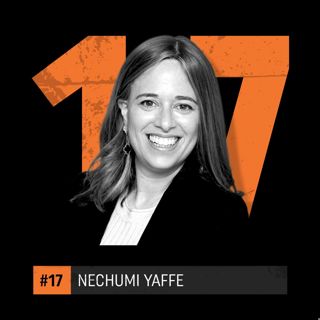
Nechumi Yaffe: 'I hate the idea that we are being killed and need to kill'
As a Haredi woman of the Israeli left, Nechumi Yaffe lives between a few different worlds—and she feels at home in Israel's new "Religious Left" movement.A professor of public policy at Tel Aviv University, Nechumi is a political and social psychologist focused on the Haredi communities in America and Israel (of which she is a part). She is a leading expert guiding the Israeli government on Haredi affairs—from COVID-19 to the education system.Since Oct. 7, Nechumi has coordinated over 100,000 Haredi emergency volunteers as part of the "Unity Command Center" and has risen as a social leader of the Religious Left ("Smol Ha-Emuni").Now, she joins Sruli Fruchter to answer 18 questions on Israel, including the Haredi draft, Israel's hostage negotiations, and religion since October 7.Here are our 18 questions:As an Israeli, and as a Jew, how are you feeling at this moment in Israeli history?What has been Israel’s greatest success and greatest mistake in its war against Hamas?How have your religious views changed since Oct. 7? What do you look for in deciding which Knesset party to vote for?Which is more important for Israel: Judaism or democracy?Should Israel treat its Jewish and non-Jewish citizens the same?Now that Israel already exists, what is the purpose of Zionism?Is opposing Zionism inherently antisemitic?Should Israel be a religious state?If you were making the case for Israel, where would you begin?Should all Israelis serve in the army?Can questioning the actions of Israel’s government and army — even in the context of this war — be a valid form of love and patriotism?What do you think is the most legitimate criticism leveled against Israel today?Do you think the State of Israel is part of the final redemption?Do you think peace between Israelis and Palestinians will happen within your lifetime?What should happen with Gaza and the Palestinian-Israeli Conflict after the war?Where do you identify on Israel’s political and religious spectrum, and do you have friends on the “other side”?Do you have more hope or fear for Israel and the Jewish People?
4 Marras 20241h
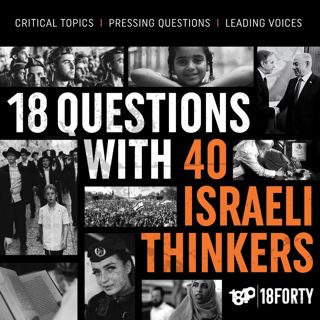
Lahav Harkov: 'We are winning'
Israel's multi-front war changes by the day—but Lahav Harkov thinks Israel is winning.A long-time journalist covering Israel's domestic and international affairs, Lahav speaks with an insider's investigation and knowledge about Israel's issues today: military strategy, hostage negotiations, international relations, and more.Previously the Senior Contributing Editor, Diplomatic Reporter and Knesset Reporter for The Jerusalem Post, Lahav is now the Senior Political Correspondent for Jewish Insider. The Jewish Telegraphic Agency previously named her the 5th-most influential person on “Jewish Twitter.”Now, she joins Sruli Fruchter to answer 18 questions on Israel, including the state of Israel's war, Western media, and the fight to free the hostages.This interview was held on Oct. 8.Here are our 18 questions:As an Israeli, and as a Jew, how are you feeling at this moment in Israeli history?What has been Israel’s greatest success and greatest mistake in its war against Hamas?Do you think Western media covers the Israel-Hamas War fairly?What do you look for in deciding which Knesset party to vote for?Which is more important for Israel: Judaism or democracy?What role should the Israeli government have in religious matters?Should Israel treat its Jewish and non-Jewish citizens the same?Now that Israel already exists, what is the purpose of Zionism?Is opposing Zionism inherently antisemitic?Is the IDF the world’s most moral army?If you were making the case for Israel, where would you begin?Can questioning the actions of Israel’s government and army — such as in the context of this war — be a valid form of love and patriotism?What do you think is the most legitimate criticism leveled against Israel today?Do you think peace between Israelis and Palestinians will happen within your lifetime?What should happen with Gaza and the Palestinian-Israeli Conflict after the war?Where do you read news about Israel?Where do you identify on Israel’s political and religious spectrum, and do you have friends on the “other side”?Do you have more hope or fear for Israel and the Jewish People?
28 Loka 20241h 1min

Netta Barak-Corren: 'I hope that Gaza will see a day when it is no longer ruled by Hamas'
Israel is facing several existential crises—at least three, by Netta Barak-Corren's account.The legal scholar and law professor at the Hebrew University of Jerusalem is intimately concerned with Israel's future and current threats. During the judicial reform, Netta authored a 45-page document (later translated into English) breaking down the problems and proper courses of action as she saw them, and most recently, she co-wrote a 28-page recommendation for the Israeli government's plan for Gaza after the war.An award-winning researcher and visiting teacher and fellow at elite universities, Netta is also a cognitive scientist and seeks empirical and pragmatic resolutions in law.Now, she joins Sruli Fruchter to answer 18 questions on Israel, including anti-Israel bias among international law experts, Israel's existential crises, and Gaza's "day after the war."This interview was held on Sept. 29.Here are our 18 questions:As an Israeli, and as a Jew, how are you feeling at this moment in Israeli history?What has been Israel’s greatest success and greatest mistake in its war against Hamas?How do you think Hamas views the outcome and aftermath of October 7—was it a success, in their eyes? What do you look for in deciding which Knesset party to vote for?Which is more important for Israel: Judaism or democracy?What role should the Israeli government have in religious matters?Should Israel treat its Jewish and non-Jewish citizens the same?Now that Israel already exists, what is the purpose of Zionism?Is opposing Zionism inherently antisemitic?Is the IDF the world’s most moral army?If you were making the case for Israel, where would you begin?Can questioning the actions of Israel’s government and army — even in the context of this war — be a valid form of love and patriotism?What do you think is the most legitimate criticism leveled against Israel today?Do you think peace between Israelis and Palestinians will happen within your lifetime?What should happen with Gaza and the Palestinian-Israeli conflict after the war?Do you think Israel is properly handling the Iranian threat?Where do you identify on Israel’s political and religious spectrum, and do you have friends on the “other side”?Do you have more hope or fear for Israel and the Jewish People?
14 Loka 20241h 9min





















